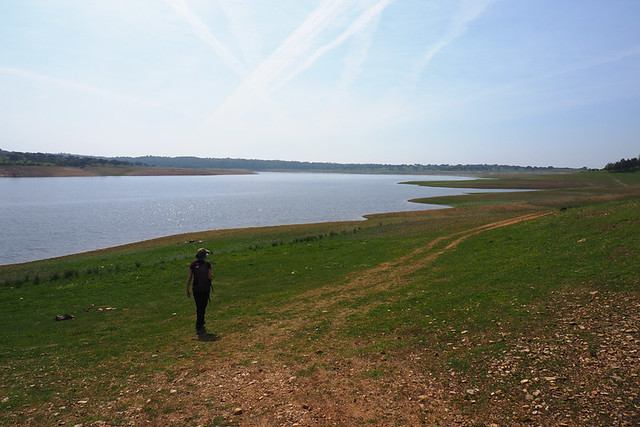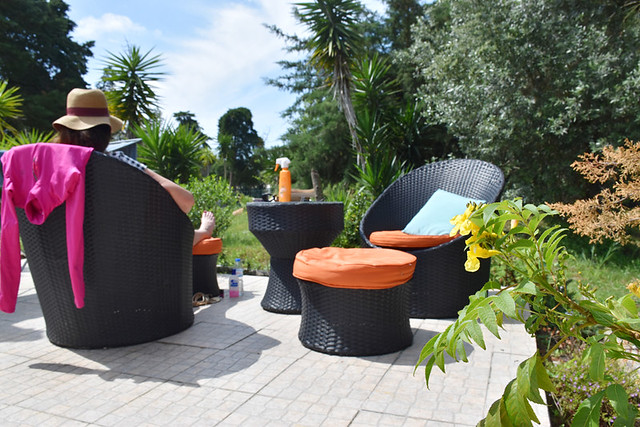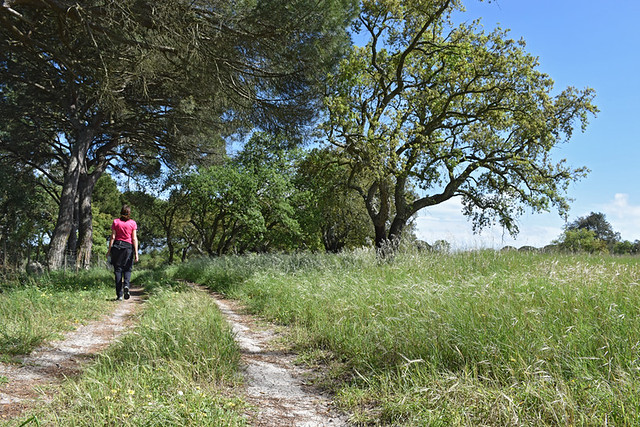At the end of January, a news report in a Spanish newspaper about the first case of COVID-19 in Spain being on La Gomera seemed just something which might cause anxiety to folk heading to the island for a holiday, especially if the UK tabloids picked up on it. Looking back, it shows just how quick off the mark the Germans were. They had tracked everyone who had come into contact with an infected doctor at a conference in Germany and their investigations led them to a rural house on La Gomera, where the man was staying with friends. Right from the off they concentrated on locating the source of outbreaks. Thanks to the Germans it was the first case of COVID-19 identified in Spain, but clearly not the first case in Spain. We passed the information on to friends at Inntravel and got on with our lives as normal.

Worried or are they just from Braga?
A month later and we’re exploring parts of central Portugal with James from Inntravel who’s spending a week checking out various parts of the country. It’s a dreary Saturday and normally picturesque towns look decidedly underwhelming. There’s an absence of people around which we put down to it being a dreary day at the end of February. We part company in Coimbra, James driving north whilst we jump on the train back to Lisbon. It’s monsoon-ing it down and there are very few people on platform as we wait for the train from Braga. We take to our seats and comment on just how oppressively silent the nearly-full train is. We figure the people from Braga are just more reserved than their southern counterparts – a woman across the aisle is crocheting a doily. The city does have that ‘Braga prays’ tag after all. But maybe the Portuguese, keeping a close eye on what is happening with their exuberant neighbours, are just more aware of the impending storm.

Alentejo and the first mask
With walking trips coming up in April we need to get the muscles into some sort of shape, so mid-March we drive south a short distance into the wilds of Alentejo, discovering one of the best walking routes we’ve notched up in the area – a heady mix of lakeside strolling and scented forest trails across hills where wild flowers are just bursting into life. Driving back home, we stop at a small supermarket to pick up something for dinner. It’s a Thursday night and cupboards are quite bare before the big Friday shop. The little supermarket is no different than normal, save for one thing; a boy of around 11 is wearing a face mask. He looks rather strange, out of place. I notice other shoppers staring at him.

The madness descends
Less than 24 hours later and I wish we’d bought more at the Alentejo supermarket. The madness we’d been reading about in British press reports descends on Portugal. There are queues of shoppers at each till, their trolleys piled high with produce including, of course, multi-packs of toilet paper. We’d been crowing to family in Britain about how the Portuguese weren’t as hysterical as some Brits, there had been no panic-buying here. I got that wrong. People around where we live don’t have much money. I say to Andy there’s no way they can sustain panic-buying like this for more than a couple of weeks. Later that night we read the Portuguese Government have introduced restrictions and social distancing recommendations. People must have got wind prior to the announcement, hence the attack of panic-buying.
What’s interesting is many Portuguese self-implemented social distancing when they saw what was happening with their neighbours. They react in an eminently sensible and pragmatic way without being directed to. As a result the Portuguese Government doesn’t introduce as strict restrictions as those in place in Spain.

Empty shelves
A week further down the line and we stumble into a horror movie scenario whenever we leave the quinta. There, surrounded by fields, vines, and cork forest, life doesn’t feel any different than it normally does. Even the village, whose streets are normally devoid of people anyway, seems much the same as usual. But the roads between the house and Palmela, where the Pingo Doce supermarket is located, are empty of cars. So is the supermarket car park for that matter. The supermarket itself is closed. They’re operating flexible hours, closing the doors to restock when shelves are empty. We try a nearby Aldi. It is open, but the aisles have been stripped. Supermarkets are now operating a restricted number of shoppers system but, as there’s very little produce on the shelves, there are few shoppers anyway, so we waltz in and leave with a tub of yoghurt, the last tin of tomatoes and a couple of tins of tuna.
We try the mini-market in the village. There’s no queue and life inside is reassuringly normal. The diminutive woman owner chats away happily to the handful of locals who still use it as much for the social aspects as shopping. We fill a basket with vegetables, beans, beer, soap, bread, eggs, water, and crisps, feeling as if we’ve struck gold. In the space of a week we’ve come to appreciate just how precious fundamentals are when they’re suddenly not so easy to get hold of. Instead of working out meals a week in advance we have to be more spontaneous, cooking with what’s available. This part is actually an improvement, we create new recipes and rediscover forgotten favourites.
We tell friends in Britain about how surreal it all is, but we can tell some can’t quite imagine the scenario we describe. Despite what’s happening in other countries, Boris Johnson’s Britain is ploughing a different field, one similar to the Netherlands and Sweden, where the herd immunity approach is being tried. Life there sounds as though it’s going on much the same as normal. It seems insanely reckless to us.

A fortnight into lockdown
It’s incredible how quickly the abnormal becomes the normal. Queuing to get into a supermarket wearing a face mask and gloves doesn’t feel quite as apocalyptic as it did just a week ago. The shelves are relatively healthy again, save for an absence of gloves and antiseptic wipes. At first we couldn’t get any fresh meat, but even the demand for that has calmed down. Whether people have adjusted to the situation or just run out of money, I don’t know. Apart from the reduced number of shoppers and the fact most, not all, wear face masks, it feels normal; more enjoyable even. What’s quite amusing is, now Boris Johnson has caved and implemented similar restrictions put in place in other countries a couple of weeks ago, friends in Britain start telling us about limitations of movement and waiting in line to get into supermarkets.
Our village shop has proved the epicentre of normality, but it illustrates a rather odd approach to COVID-19. In the bigger supermarket in Palmela there is no interaction between shoppers, everyone maintains a respectful distance. In the village shop, some locals behave much as they normally would. It’s as if they believe the virus only wears a stranger’s face. Dona Catarina has been guilty of the same. She keeps her distance from us, almost to the point of running away whenever she saw us in the early days. But when the water stopped running and she had to call in an electrician she knew to fix the pump, she walked beside him as normal. COVID-19 has also caused an outbreak of irrational behaviour.

The last week in April
A pattern has well and truly been established. All paid work and income from sales of guides has virtually dried up, and some outstanding trips we were seriously excited about have been cancelled. Others for later in the year are close to being cancelled. But there have been upsides. We’ve both been able to concentrate on a couple of projects which have been sidelined for a long time due to other commitments. Subsequently, work patterns remain similar, except we stop work early afternoon to catch up with reading books that have been left to gather dust for far too long. At around 16:00 we pull on our hiking boots and take to the cork forest right outside the farm’s gate. There is a network of tracks in the forest and surrounding fields, most are access for cork workers; although, we’ve never seen anybody actually stripping a tree of its cork. The tracks mean we can mix and match paths, creating different routes of between four and five kilometres, all the time. The irony is, notching up on average 30km, we now walk more in a week when we’re at home than we did pre-lockdown. As it’s spring, the countryside is a much appreciated antidote – there is no endless, stress-inducing stream of sensational news among the viper’s bugloss and Mediterranean thistles. Shopping yesterday seemed even more normal than in previous weeks; no queue to get in, shelves fully stocked, more cars on the road.

There have been no new cases in Setúbal for a few days and mortality rates in Portugal are lower than in many other European countries. Where the death rate in Spain is 45.5 per 100,000, in Portugal it’s 7.4. Incidentally, Britain is 26.
Possibly people are relaxing slightly, maybe a new normality, whatever that means, is beginning to take shape.




Be the first to comment